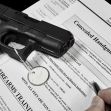The U.S. Supreme Court on Monday declined to review a major Second Amendment challenge to Maryland’s law banning certain semiautomatic rifles, including the AR-15. The Court's brief, unsigned order offered no explanation, leaving the 2013 Maryland statute in effect.
This decision underscores the Court’s cautious approach toward Second Amendment disputes, having issued only three substantial rulings on gun rights since recognizing an individual right to firearm ownership in 2008. The Maryland law was enacted after the tragic mass shooting at Sandy Hook Elementary School, which prompted the state legislature to ban various semiautomatic rifles and impose a 10-round limit on gun magazines.
Justices Clarence Thomas, Samuel A. Alito Jr., and Neil M. Gorsuch dissented, signaling their interest in examining the issue. Justice Thomas expressed frustration at the Court’s continued avoidance of this constitutional question, asserting, “I would not wait to decide whether the government can ban the most popular rifle in America.” He criticized the majority's passive stance, stating the Court treats the Second Amendment as a “second-class right.”
Justice Brett M. Kavanaugh, while declining to join the dissenters, acknowledged the issue's importance and indicated that it might soon merit the Court’s attention. He suggested that further lower-court opinions could help clarify the complexities before Supreme Court intervention. Kavanaugh remarked that the Court "should and presumably will address the AR-15 issue soon, in the next term or two."
The Fourth Circuit Court of Appeals previously upheld Maryland's law in a 10-to-5 ruling. Judge J. Harvie Wilkinson III, appointed by President Ronald Reagan, wrote the majority opinion, arguing that military-style semiautomatic rifles are not protected under the historical interpretation of the Second Amendment established by the Supreme Court in the 2022 decision New York State Rifle & Pistol Association v. Bruen. Wilkinson emphasized that such firearms are "ill-suited and disproportionate to the need for self-defense."
Five dissenting judges at the appellate level, all Republican appointees, argued the majority ignored precedent and distorted historical interpretations to uphold the ban. Judge Julius N. Richardson, appointed by President Donald Trump, criticized the majority for neglecting the plain text of the amendment and inaccurately portraying the weapons' lawful uses.






